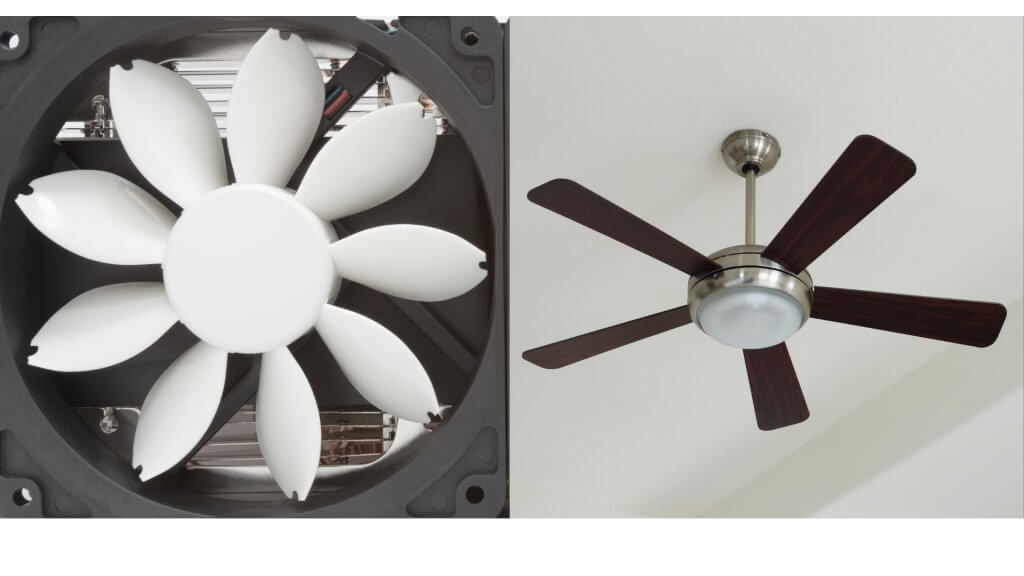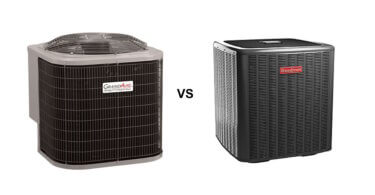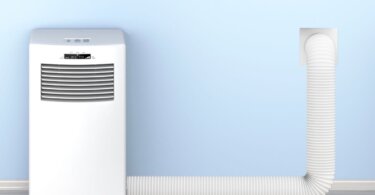During the hot summer season, people try to cool down their homes as much as they can. And while there are plenty of ways to bring down the summer heat, fans and air conditioners continue to dominate as space coolers.
Whenever the temperatures are high, you can always count on these two appliances to cool you off effectively. In fact, almost 90% of houses across the states now have air conditioning, compared to only 47% in the 70s; not having a cooling appliance at home is just not an option anymore!
Even though both fans and air conditioners work to keep you cool, they are not the same in terms of energy consumption and costs. Fans are mostly considered a cheaper alternative to air conditioners, but is that really the truth? Fan vs AC cost: what is cheaper?
Let’s find out.

Does A Ceiling Fan Use as Much Electricity as an Air Conditioner?
It is no surprise that air conditioners cost more to run than a typical ceiling fan. But many people still believe that their AC is the only proper way of cooling their home.
According to an article in the New York Times, central air conditioners use 3 kilowatts while they cost you $0.36 per hour. A window air conditioner, on the other hand, uses 1.2 kilowatts, costing around $0.14 per hour. Lastly, the common ceiling fan consumes only 30 watts at about $0.01 per hour.
From this, we can work out that a 2.5 ton AC uses around 3,500 watts whereas a ceiling fan takes up anywhere from 15 to 95 watts, based on its size and speed. Your central air conditioner can get you a $129.60 per month energy bill. But a single ceiling fan will only cost you somewhere around $1.20 for the whole month. That is one huge difference for sure!
It is amazing to think how you can actually save 99% of the total energy costs by using only ceiling fans instead of air conditioners. However, in our opinion, the best thing to do is to use both your fan and AC together – this way you can chill your house for longer.
With your fan circulating the cold air from the AC in your room, you can raise the temperature by as much as 12 degrees while maintaining the same level of cooling throughout your home.
Fan vs AC: Total Cost of Use
Using a fan is considered cheaper than running an air conditioner. But calculating the total cost of each appliance isn’t as straightforward as several variables have to be taken into account. Another factor to consider is the cooling effect that you get from a fan compared to an air conditioner.
Related article: How To Save Money On Air Conditioning – 12 Energy-Saving Tips
Is It Cheaper to Run A Ceiling Fan or a Pedestal Fan?
Whether you talk about ceiling fans or pedestal ones, they all come in two types of electrical motors. The first are fans that run on AC motors and the second that runs on DC motors. For your understanding, most household appliances run on AC motors.
Alternating Current (AC) fans run on 110 Volts directly by plugging into the power socket in your home. Unlike AC fans, Direct Current (DC) fans convert alternating current to direct current before operating, which makes them use up less energy than older AC fan models.
Another great feature of DC fans is that they help in saving money in the long run. The initial cost of buying is high because they use the latest technology. However, paying the extra amount is totally worth it as you will easily recoup the initial amount by paying less on your electric bill.
How Much Does It Cost to Run An AC Unit?
In contrast, indoor air conditioning consumes the most power throughout the United States. The hotter the state, the more people will run their air conditioners, consuming more electricity.
The U.S. Energy Information Agency statistics show that air conditioners consume about 17% of all energy used in American households. But this percentage can go up to about half of your entire energy consumption during the summer months. With so much energy being used, your bill will easily shoot up to $400 – $500. Hence your continuous use of ACs is the main reason why your bill is so high.
Is It Cheaper to Leave the AC on All Day?
Ceiling fans can help cool you down through evaporation, but there is one thing they can’t do; they can’t reduce the room temperature. So, for that, you must use an air conditioner. Although using ACs is expensive, keeping them on during extremely hot weather will normally be cheaper.
Nowadays, air conditioners with high SEER and EER use less energy than those with lower ratings. Furthermore, inverter-powered ACs are also a great option if you want to keep your house cool for a longer time.
Related article: How To Calculate EER HVAC?
Buying one initially is going to be more expensive; however, this purchase will prove to be cost-beneficial and energy-efficient down the road. Also, most inverter air conditioners come with smart controls, so you can automate the cooling process, allowing you to consistently save energy throughout the day.
To further increase your cost savings, you can use your ceiling fan in combination with your AC. It will circulate the cool air around, which will help maintain a pleasant temperature for longer. When your air conditioner thermostat sits at a higher temperature, there will be a 1% reduction in energy use. So, for instance, if you increase the temperature by 4 degrees from 74 degrees to 78 degrees, the energy bill will see a drop from $400 to $384 per month.
Related article: What Temperature Should I Set My Air Conditioner?
Fan vs AC: Final Verdict
Fans clearly cost much less than air conditioners. However, the comparison between the two cooling appliances isn’t as black or white as we would like it to be. Fans don’t work to lower room temperature. Instead, they circulate air around causing evaporation which causes a cooling effect.
Air conditioners, however, are meant to cool down the room temperature. This means the best course of action when it comes to saving money with fans and ACs is to use them together to achieve energy-saving and cooling. With the fan, your AC can be set at a little higher temperature than usual which will help save you money over time.
Related article: Whole-House Fans Pros And Cons





Leave a Comment